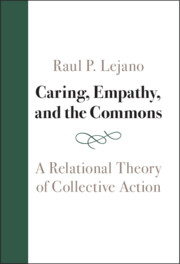Caring, Empathy, and the Commons
People are not autonomous individuals but connected beings. Curae ergo sum – we care, therefore we are. Relationality – which refers to the ethic and manner by which relational considerations govern decisions and institutional arrangements can take advantage of the power of connection – uncovers how social connection, across divides, moves people to act for the other. Drawing from research on empathy, social networks, and determinants of pro-social behavior, Caring, Empathy, and the Commons builds on Ostrom's Governing the Commons. It offers a different mechanism by which collective action is induced, arguing that, sometimes, the individual thinks not in terms of individual gain but in terms of the other. Developing this concept of relationality, this book explores various strands of literature and examines how this idea might be used to foster collective action around climate, species protection, fair trade, and other dilemmas of the commons.
- Emphasizes conceptual clarity, non-technical language (or technical language with adequate explanation), and 'signposting' to make the text easier to follow.
- Ties together different important bodies of literature: political economy of collective action, psychological theory of empathy, and institutional theory of governance appealing to a wide and diverse audience.
- Parallels the logical development of the idea used by Elinor Ostrom in her book, Governing the Commons
Product details
August 2023Hardback
9781316518779
178 pages
236 × 159 × 17 mm
0.41kg
Available
Table of Contents
- 1. Introduction: Caring for the commons
- 2. Constructing a relational theory of collective action
- 3. Further justifications of the relational theory
- 4. Illustrations: Pro-Social/Pro-Environmental behavior
- 5. Illustrations: Governing the commons
- 6. Institutional considerations
- 7. Prospects of relationality.






